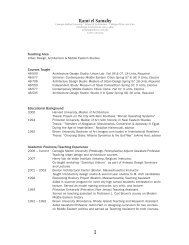2013 - Carnegie Mellon University
2013 - Carnegie Mellon University
2013 - Carnegie Mellon University
You also want an ePaper? Increase the reach of your titles
YUMPU automatically turns print PDFs into web optimized ePapers that Google loves.
My ears processed her next words with an intense clarity,<br />
like time had stopped and it was only Now and would only ever be<br />
Now in her car with the soft sounds of the engine and the cold and<br />
the shivering and the dark.<br />
“Well,” she began, her voice almost cracking at its high<br />
pitch.<br />
Kendra’s voice has never been gentle. Its medium-loud volume<br />
is laced with an undercurrent grating that surfaces when her<br />
voice is tight with stress.<br />
“Well,” Kendra said. “Leah and I…are dating.”<br />
“Oh,” I said. “Okay. Wow.”<br />
* * *<br />
Kendra and I hadn’t always been good friends. I had met<br />
her in middle school because she was friends with a few of my<br />
friends—I seemed to meet all of my friends in middle school<br />
through a domino chain of acquaintances. At that point, I just<br />
knew her as the girl who had said that my hair looked almost<br />
blonde in the lighting on our school stage. And also that her parents<br />
didn’t want her reading Harry Potter.<br />
* * *<br />
Kendra is the oldest of four girls. Her family proudly calls<br />
themselves Christians. Kendra went with her family to church every<br />
weekend—the same church at which her parents had met. They<br />
knew their pastors and youth pastors well. They had family friends<br />
from church, which is how Kendra met her first “boyfriend”—as far<br />
as I know, the most they ever did was sit together on the couch and<br />
hold hands when their families got together. Poor Kendra is embarrassed<br />
by that story now and prefers not to think about it.<br />
Kendra’s parents had never read Harry Potter, but they<br />
thought it was evil and didn’t want Kendra reading it. Kendra<br />
agreed with her parents on almost all of their beliefs, but not this<br />
one. Even then, Kendra read much more than her parents did, and<br />
she was always much more interested in learning. She read the<br />
books in secret, borrowing them from friends or checking them<br />
out from the library, covering them in book-socks so they looked<br />
like textbooks, hiding them in her room so her parents would never<br />
find them.<br />
I remember discussing this with her when we were in eighth<br />
grade, before we were really friends. She was telling me about how<br />
her parents didn’t understand, how they were wrong about this.<br />
“Well,” I said hesitantly. “Maybe if they’re wrong about this,<br />
they’re wrong about some other things, too.”<br />
“Eh, no,” she said, easily dismissing the idea.<br />
Sometimes Kendra has a great memory. In high school,<br />
she could reel off fifty-some digits of pi, and she never had trouble<br />
memorizing math or physics formulas for exams. But other times,<br />
it takes our entire circle of friends to convince her that a certain<br />
conversation did or didn’t happen.<br />
If I were to remind her of this conversation, I know she<br />
would have no memory of it. The idea of blindly trusting her parents’<br />
beliefs is too foreign to her now.<br />
* * *<br />
It’s hard for me to remember exactly how Kendra and I<br />
became friends when our families’ beliefs and backgrounds were so<br />
drastically different. Kendra’s parents always supported conservative<br />
political candidates; my parents’ beliefs nearly always lined up<br />
with liberal candidates’ positions. Her family supported her going<br />
with her youth group every year to the annual March for Life held<br />
in Washington D.C.—a pro-life event petitioning against legalizing<br />
abortions and against past decisions to legalize abortions. My family<br />
believes in allowing women to have safe access to abortions, and<br />
for women to make their own choices regarding their bodies and<br />
health.<br />
Another difference between our families is how we either<br />
accept or don’t accept differences in sexuality. My parents have gay<br />
and lesbian friends, and I remember them speaking honestly about<br />
a member of our own extended family whom they knew to be gay.<br />
They were fine with it, and saddened that he even had to hide it at<br />
all.<br />
Kendra once told me how her parents felt about gays and<br />
lesbians. One day, her family had been watching T.V. when Who<br />
Wants to Be a Millionaire? came on. One of the contestants had<br />
clearly been gay, his voice and mannerisms making it obvious—and<br />
when they had showed his family member in the audience, it had<br />
26 27


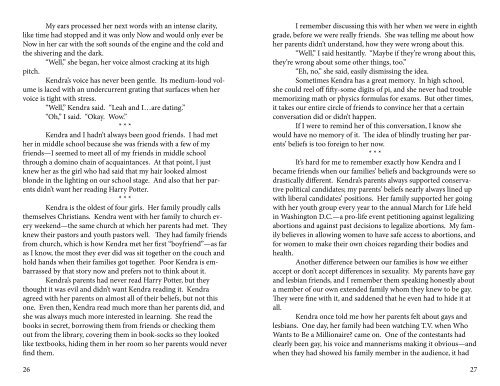
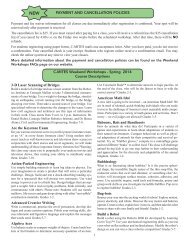
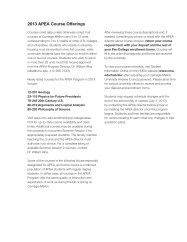

![Pittsburgh Neighborhoods [.pdf] - Carnegie Mellon University](https://img.yumpu.com/22011290/1/190x115/pittsburgh-neighborhoods-pdf-carnegie-mellon-university.jpg?quality=85)
![Curriculum Vitae [.pdf] - Carnegie Mellon University](https://img.yumpu.com/20737100/1/190x245/curriculum-vitae-pdf-carnegie-mellon-university.jpg?quality=85)
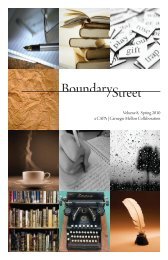
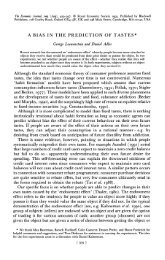

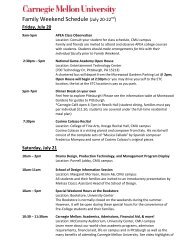
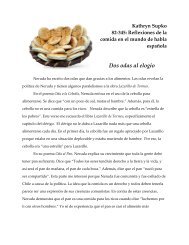


![May 2012 [.pdf] - Carnegie Mellon University](https://img.yumpu.com/12198417/1/190x253/may-2012-pdf-carnegie-mellon-university.jpg?quality=85)
